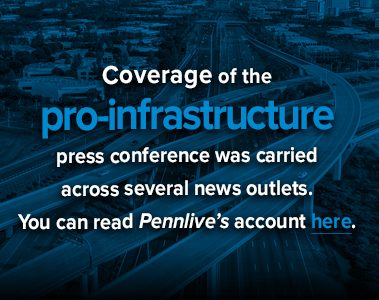The PA Chamber, state lawmakers and the U.S. Chamber recently joined forces in urging U.S. House lawmakers to approve a bipartisan infrastructure funding bill that will boost Pennsylvania’s economic competitiveness and establish a more robust environment for job creation and equality of opportunity for every Pennsylvanian.
 On August 19, PA Chamber President Gene Barr, U.S. Chamber Senior Vice President for Policy Neil Bradley, Greater Philadelphia Chamber of Commerce’s Council for Growth Executive Director Claire Greenwood, and state Sen. Wayne Langerholc – who also chairs the Senate Transportation Committee – hosted a virtual press conference that made the case for infrastructure investment at a critical time for the state’s economy. The investments they championed include everything from traveling on safer roads and bridges, to improving public transit for people getting to and from work, to making sure our drinking water is safe and that people in more rural areas of the state have access to broadband services.
On August 19, PA Chamber President Gene Barr, U.S. Chamber Senior Vice President for Policy Neil Bradley, Greater Philadelphia Chamber of Commerce’s Council for Growth Executive Director Claire Greenwood, and state Sen. Wayne Langerholc – who also chairs the Senate Transportation Committee – hosted a virtual press conference that made the case for infrastructure investment at a critical time for the state’s economy. The investments they championed include everything from traveling on safer roads and bridges, to improving public transit for people getting to and from work, to making sure our drinking water is safe and that people in more rural areas of the state have access to broadband services.
During the event, Barr stressed that the legislation would further our “Bringing PA Back” agenda – as infrastructure stands as one of the core pillars that is essential in setting our economy up to compete globally in the 21st century with a skilled, inspired workforce. Should the “Infrastructure Investment and Jobs Act” pass, Pennsylvania would receive $11.3 billion for roads and highway projects, $1.6 billion for bridge replacement and repair, $100 million for broadband connectivity in underserved areas, $1.5 billion for drinking water projects, and $171 million for electric vehicle charging infrastructure.
The PA Chamber believes investing in infrastructure is not only a core function of state government, but essential in expanding access to the goods and services that businesses provide. In addition, permit streamlining reforms that are included in the bill would help cut through some of the costly, onerous red tape that extends the completion of projects in communities statewide.
As of this writing, the bill has been locked in for a vote in the U.S. House in late September.